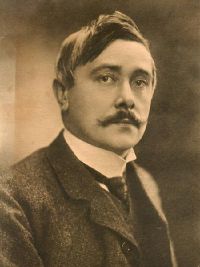Maurice Maeterlinck
Maurice Polydore Marie Bernard Maeterlinck (August 29, 1862 – May 6, 1949) was a Belgian playwright, poet, and essayist who was a Fleming, but wrote in French. He was awarded the Nobel Prize in Literature in 1911. His plays form an important part of the Symbolist art movement, which was influenced by Theosophy. Among his favorite themes were those of death and the meaning of life, occultism, ethics and natural history.
Theosophical influence
Maeterlinck was familiar with the writings of H. P. Blavatsky and later Theosophists and valued the explanations offered. However, he regretted that many important statements were not presented according to more scholarly standards and that clairvoyant's claims were beyond the possibility of proof.
According to scholar Michael Ballin, Maeterlinck considers the following Theosophical elements as of outstanding interest to modern man:
- The rediscovery of Egyptian sources.
- A sense of the common unity of religions.
- The concept of an Atlantean past from which Man has declined.
He also emphasized the idea that God can be found within oneself, and the correlation between the macrocosm and the microcosm.[1]
In books such as Our Eternity (1909) and The Great Secret (1922), Maeterlinck examines the Theosophical view on different subjects. The following are some excerpts from The Great Secret:
After considering the documentary evidence, I must admit that it is after all quite possible that the highly respectable Dr. Hodgson may himself have been the victim of trickery more diabolical than that which he believed himself to have unmasked.[2]
"Isis Unveiled," "The Secret Doctrine," and the rest of Madame Blavatsky's very numerous works form a stupendous and ill-balanced monument, or rather a sort of colossal builder's yard, into which the highest wisdom, the widest and most exceptional scholarship, the most dubious odds and ends of science, legend and history, the most impressive and most unfounded hypotheses, the most precise and most improbable statements of fact, the most plausible and most chimerical ideas, the noblest dreams, and the most incoherent fancies are poured pell-mell by inexhaustible truck-loads. There is in this accumulation of materials a considerable amount of waste and fantastic assertions which one rejects a priori; but it must be admitted, if we intend to be impartial, that we also find there speculations which must rank with the most impressive ever conceived.[3]
"The Secret Doctrine" is a sort of stupendous encyclopedia of esoteric knowledge, above all as regards its appendices, its commentaries, its parerga, in which we shall find a host of ingenious and interesting comparisons between the teachings and the manifestations of occultism throughout the centuries and in different countries. Sometimes there flashes from it an unexpected light whose far-spreading rays illuminate regions of thought which are rarely frequented to-day. In any case, the work would prove once again, if proof were needed, and with unexampled lucidity, the common origin of the conceptions which were formed by the human race, long before history as we know it, of the great mysteries which encompassed it.[4]
Notes
- ↑ Jane Campbell and James Doyle (eds.), The Practical Vision: Essays in English Literature in Honour of Flora Roy (Waterloo, Ontario: Wilfrid Laurier University Press, 1978), 89.
- ↑ Maurice Maeterlinck, The Great Secret, (New York: The Century Co., 1922), 200.
- ↑ Maurice Maeterlinck, The Great Secret, (New York: The Century Co., 1922), 200-201.
- ↑ Maurice Maeterlinck, The Great Secret, (New York: The Century Co., 1922), 2003-204.
